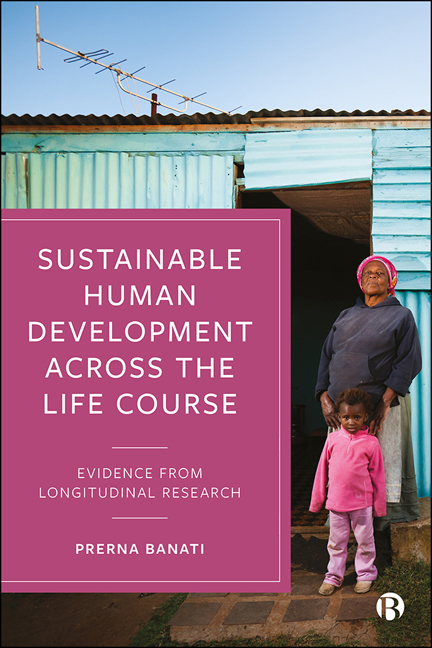Book contents
- Frontmatter
- Dedication
- Dedication
- Contents
- List of Figures, Tables and Boxes
- Notes on Contributors
- Foreword: Understanding and Enhancing Human Development Among Global Youth – On the Unique Value of Developmentally Oriented Longitudinal Research
- Introduction: Measuring Sustainable Human Development Across the Life Course
- 1 Exploring the Potential for Gender Norm Change in Adolescent Girls: Evidence from ‘Real Choices, Real Lives’ Longitudinal, Qualitative Study Data
- 2 Unequal Educational Trajectories: The Case of Ethiopia
- 3 Early Life Transitions Increase the Risk for HIV Infection: Using Latent Class Growth Models to Assess the Effect of Key Life Events on HIV Incidence Among Adolescent Girls in Rural South Africa
- 4 Achieving the Sustainable Development Goals: Evidence from the Longitudinal Parenting Across Cultures Project
- 5 Achieving Gender Equality: Understanding Gender Equality and Health Among Vulnerable Adolescents in the Sustainable Development Goals Era
- 6 Capturing the Complexities of Adolescent Transitions Through a Mixed Methods Longitudinal Research Design
- 7 Child Well-being Across the Life Course: What Do We Know, What Should We Know?
- 8 Mauritian Joint Child Health Project: A Multigenerational Family Study Emerging from a Prospective Birth Cohort Study: Initial Alcohol-related Outcomes in the Offspring Generation
- Conclusion: The Future of Longitudinal Research
- Index
Foreword: Understanding and Enhancing Human Development Among Global Youth – On the Unique Value of Developmentally Oriented Longitudinal Research
Published online by Cambridge University Press: 05 January 2022
- Frontmatter
- Dedication
- Dedication
- Contents
- List of Figures, Tables and Boxes
- Notes on Contributors
- Foreword: Understanding and Enhancing Human Development Among Global Youth – On the Unique Value of Developmentally Oriented Longitudinal Research
- Introduction: Measuring Sustainable Human Development Across the Life Course
- 1 Exploring the Potential for Gender Norm Change in Adolescent Girls: Evidence from ‘Real Choices, Real Lives’ Longitudinal, Qualitative Study Data
- 2 Unequal Educational Trajectories: The Case of Ethiopia
- 3 Early Life Transitions Increase the Risk for HIV Infection: Using Latent Class Growth Models to Assess the Effect of Key Life Events on HIV Incidence Among Adolescent Girls in Rural South Africa
- 4 Achieving the Sustainable Development Goals: Evidence from the Longitudinal Parenting Across Cultures Project
- 5 Achieving Gender Equality: Understanding Gender Equality and Health Among Vulnerable Adolescents in the Sustainable Development Goals Era
- 6 Capturing the Complexities of Adolescent Transitions Through a Mixed Methods Longitudinal Research Design
- 7 Child Well-being Across the Life Course: What Do We Know, What Should We Know?
- 8 Mauritian Joint Child Health Project: A Multigenerational Family Study Emerging from a Prospective Birth Cohort Study: Initial Alcohol-related Outcomes in the Offspring Generation
- Conclusion: The Future of Longitudinal Research
- Index
Summary
The goal of developmental science is to describe, explain and optimize within-person change and between-people differences in within-person change across the life span (ontogeny) (Lerner, 2018). As such, repeated assessments of individuals across x-axis (temporal) divisions is the sine qua non of the essential features of developmental science research. In other words, to fulfil the goal of developmental science, longitudinal designs are required to obtain evidence contributing to understanding or to enhancing ontogenetic change (Collins, 2006). However, measuring one or more individuals at two or more successive ontogenetic points is a necessary but insufficient basis for developmental longitudinal research.
As is documented by the chapters across this volume, repeated measures must be taken at points of ontogeny for which there is a theoretical basis for expecting these measures (1) to assess changing features of (that is, variational or, ideally, transformational tipping points in) the process of development and/or (2) to constitute optimal ontogenetic points in which to enact interventions to enhance the course of developmental change. As is now understood by increasing numbers of developmental scientists, the development process involves relations between attributes of the individual and features of their tiered social, institutional, physical and cultural ecology, an ecology that changes integratively across history (for example, Bronfenbrenner and Morris, 2006; Elder et al, 2015; Overton, 2015).
Moreover, the developmental relations between an individual and the context are not independent. Contemporary theories of human development which emphasize that individual–context relations are mutually influential, represented most often in the literature as individual↔context relations, are at the cutting-edge of developmental science (Dick and Muller, 2017; Lerner, 2015, 2018). The individual–context relations depicted in these models involve dynamic and systematic relations across time and place (Elder et al, 2015). Dynamic models of human development processes require developmentally oriented longitudinal research to be tested.
The chapters in this volume both reflect and expand the theoretical, methodological and empirical foundations of this relational, dynamic developmental systems approach to using longitudinal methods to describe, explain and optimize the ontogenetic development of diverse global youth. Indeed, the chapters portray the ways in which developmentally oriented longitudinal research is uniquely suited to illuminate the features of both individuals and contexts that must be integratively studied to actualize the health and sustainable development of young people.
- Type
- Chapter
- Information
- Sustainable Human Development across the Life CourseEvidence from Longitudinal Research, pp. xxvii - xxxivPublisher: Bristol University PressPrint publication year: 2021



